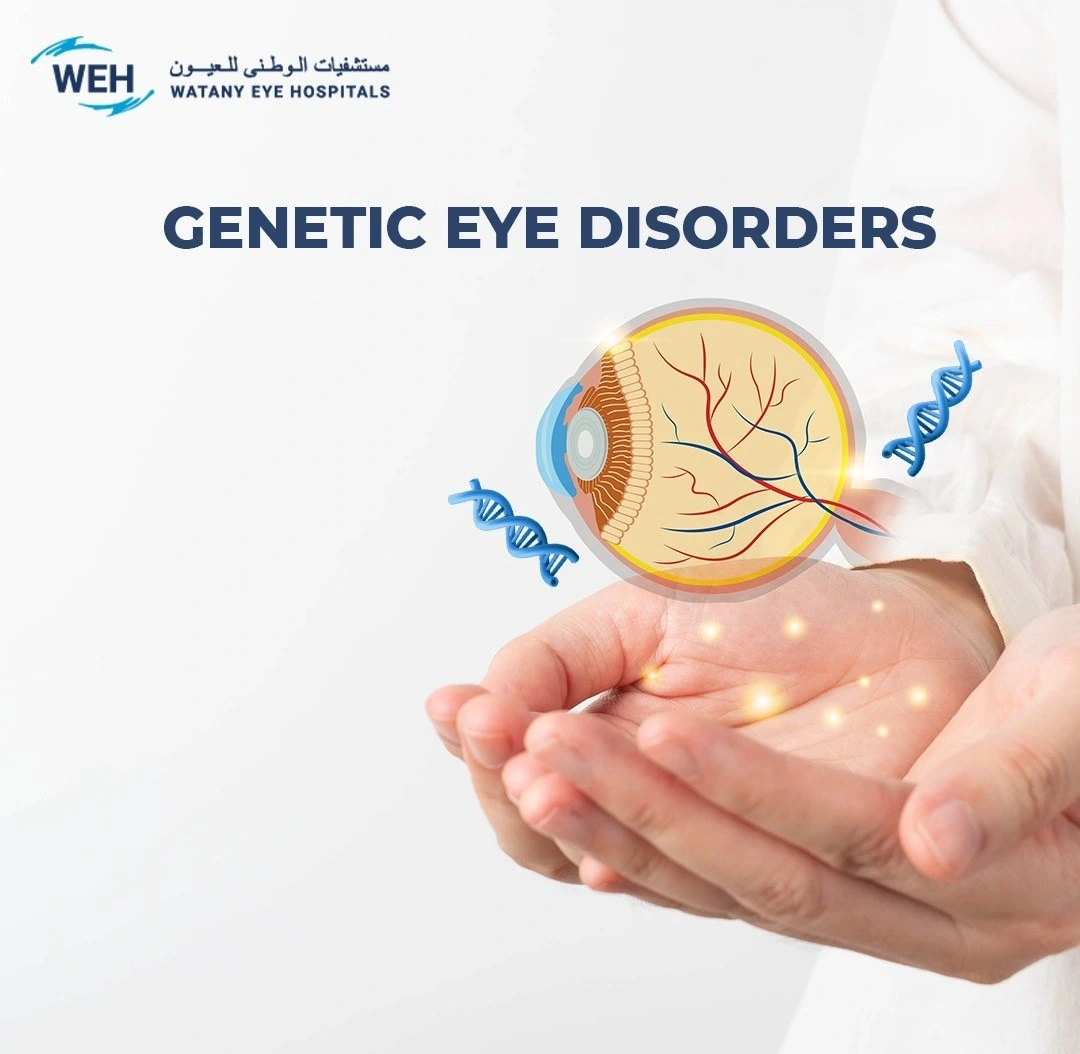
At Watany Eye Hospitals, our Ophthalmogenetic Clinic specializes in diagnosing and managing genetic eye disorders. These conditions, often passed down through families, can have a significant impact on vision. This article aims to provide patients with a better understanding of genetic eye disorders, their causes, symptoms, and available treatments.
What Are Genetic Eye Disorders?
Genetic eye disorders are caused by inherited or newly developed mutations in genes that affect eye health. These conditions can range from mild issues like cataracts to severe vision loss. While some disorders may appear at birth, others develop over time.
Common Causes of Genetic Eye Disorders
• Inheritance: Disorders passed down from parents to children.
• Gene Mutations: New genetic changes that occur spontaneously.
• Gene Interactions: Multiple genes interacting to cause disease.
How Do Genetic Mutations Affect the Eyes?
Genes play a crucial role in the development and function of the eyes. When a genetic mutation occurs, it can lead to:
- • Abnormal eye growth, resulting in structural deformities.
• Defective development of key components like the cornea, lens, or retina.
• Refrain from applying eye makeup for at least a week to prevent bacteria from entering the eye and causing an infection.
• Impaired eye functions, including focus, light sensitivity, or signal transmission to the brain.
Types of Genetic Eye Disorders
Common genetic eye disorders include retinitis pigmentosa, a condition that causes progressive vision loss, and congenital cataracts, which affect the lens clarity from birth. Other prevalent genetic conditions are color blindness, which impairs the ability to distinguish certain colors, and glaucoma, often inherited, leading to optic nerve damage. These disorders vary in severity and can impact vision from early childhood to adulthood.
Who Is at Risk?
• Family History: A major risk factor for genetic eye conditions.
• Consanguinity: Marriages between close relatives can increase the likelihood of passing on genetic conditions.
• Environmental Influences: External factors interacting with defective genes can sometimes trigger disease.
Recognizing the Symptoms
Genetic eye disorders can present with a variety of symptoms, such as:
- • Blurred or reduced vision.
• Increased sensitivity to light.
• Difficulty seeing at night.
• Loss of peripheral (side) vision.
• Halos around lights.
How Are Genetic Eye Disorders Diagnosed?
At Watany Eye Hospitals, we use advanced diagnostic tools to identify these conditions:
- • Comprehensive Eye Exams: To assess the health and function of the eyes.
• Genetic Testing: To confirm the presence of specific gene mutations.
• Family History Analysis: To evaluate inherited risk factors.
• Specialized Testing: Including retinal imaging, visual acuity tests, and intraocular pressure measurement.
Treatment Options
While some genetic eye disorders may not have a cure, effective treatments can help manage symptoms and improve quality of life. Emerging therapies for genetic eye diseases hold great promise, and identifying your specific genetic mutation can open doors to innovative research opportunities and cutting-edge treatments.
The Role of Early Diagnosis
Early detection is essential for managing genetic eye disorders. It can help:
- • Prevent or delay vision loss.
• Provide access to effective treatments.
• Support family planning decisions for those with a genetic predisposition.
How to Protect Your Vision
- • Regular Check-Ups: Schedule routine eye exams, especially if you have a family history of eye conditions.
• Healthy Lifestyle: Maintain a balanced diet rich in vitamins A and C, and manage blood sugar and blood pressure levels.
• Genetic Counseling: Learn more about your genetic risks and explore preventive options.
Watany Eye Hospital’s Advice:
Preventing inherited eye diseases is an ongoing process between the patient and the ophthalmologist. Don’t hesitate to consult your doctor regularly, as early diagnosis and prompt treatment are key to maintaining your eye health.